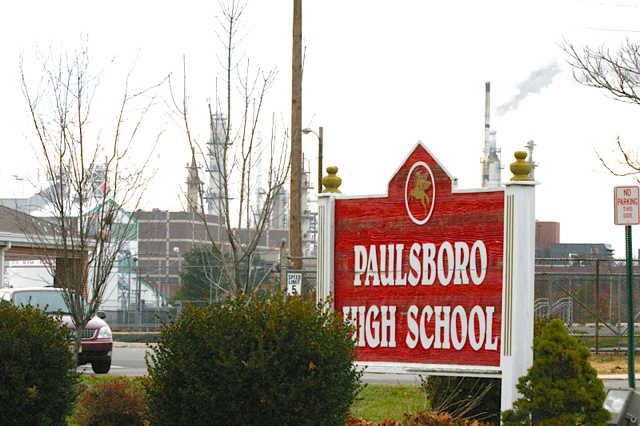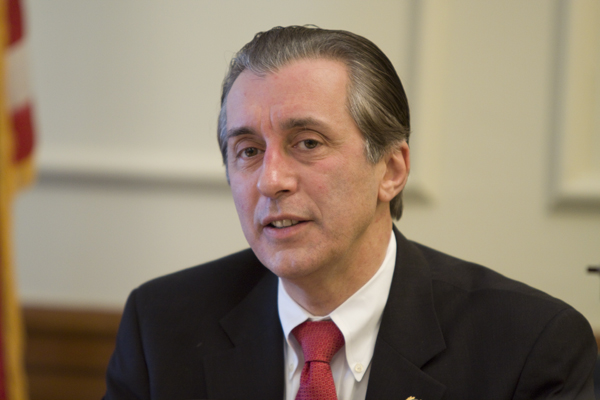Democrats in Legislature Join Christie “Red Tape” Environmental Rollback Juggernaut
Why Roll Back NJ Environmental Standards To Federal Minimums?
Why handcuff DEP enforcement? And why would Democrats join Governor Christie in doing so?

Paulsboro High School in shadow of Valero toxic air emissions – in Burzichelli’s district.
[Update 2 : NJ Spotlight coverage: Assembly Committee Bans Guidance Documents – DEP is primary target of prohibition
[Update 1: 4/5/10 – Philly Inquirer story: “Committee ponders limits of state agencies’ regulations“]
Less than 48 hours after the first “public” (by invite only) meeting of the “Red Tape Review Group” led by the new Regulatory Czar established by Governor Christie’s Executive Orders #1 (a moratorium on certain regulations) and EO#2 (“common sense” regulatory policies including cost benefit analysis and rollback to federal minimums) and EO #3 (Red Tape Review Group) (for press coverage of that meeting, see “NJ red-tape review board gets an earful“), today an Assembly Regulatory Oversight Committee rammed through a dangerous bill to gut enforcement of a broad array of DEP public health and environmental protections.
The bill in question, A2464 (Burzichelli (D – Valero), was not even drafted or formally introduced at the time of the hearing. The bill was opposed strongly by virtually all environmental groups. Following this testimony, a committee aide read the extremely complex bill aloud, with extensive amendments. Amazingly, not even having read what they were considering, the Committee then voted unanimously to approve and release the bill.

Assemblyman Burzichelli – is he representing Valero or his constituents?
Burzichelli’s Committee also took testimony on proposed legislation to block state agencies from adopting regulations that are stricter than federal minimums without prior and explicit legislative authorization (in other words, rollback followed by paralysis).
Both moves have been long sought and were loudly applauded by lobbyists for the highly polluting chemical and energy industries. And it was no secret that DEP and environmental regulations were the target of both bills.
But why on earth would the Governor’s rollback agenda – bad policy, deeply unpopular, and opposed by 79% of New Jerseyans according to a recent poll – be supported by democrats in the Legislature?
Burzichelli and the Committee hid behind the Christie Executive Orders’ “Red Tape” process to target and scapegoat DEP and environmental regulations as causing or contributing to the economic collapse.
While the testimony focused on legal esoterica of administrative law and environmental regulation, it was obvious from the outset – despite repeated denials by Burzichelli – that the agenda and policy objective was to use the economic crisis as a pretext and to provide cover for an extremist DEP and environmental dismantling exercise long been sought by the polluters and developers of NJ.
Now that the dual economic and fiscal crises have hit, industry lobbyists are cynically, viciously, and shamelessly exploiting the situation.
Here is the Committee’s last minute posted agenda announcement:
The committee will hear testimony from the public concerning the feasibility of prohibiting a State agency from filing with the Office of Administrative Law a notice of proposal or notice of adoption for any rule that would exceed federal standards or requirements unless specifically authorized by State law. A-2464 Burzichelli – Requires all State agency rules be published in NJ Register, and prohibits use of regulatory guidance documents unless specifically authorized by State law.
Right.
DEP testified in support of the legislation by announcing that Acting Commissioner Martin will soon issue an Administrative Order that will make all existing DEP guidance voluntary. In another radical departure from 35 years of policy and administrative practice at DEP, Martin will mandate that only adopted regulatory requirements are enforceable.
Assistant Commissioner Kropp even admitted that the intent was to shield newly Licensed Site Professional toxic site cleanup contractors from enforcement actions by DEP or the newly created Licensing Board. After having successfully privatized the NJ toxic site cleanup program, polluters are now seeking to gut the technical requirements of the cleanup program, which are implemented via “guidance documents”.
Recent very high profile illustrations of the importance of enforceable DEP guidance documents and Technical Manuals are: 1) chemical vapor intrusion into 450 homes in Pompton Lakes from the Dupont site; 2) chemical vapor intrusion into Atlantic Highlands Elementary school from a nearby toxic site; 3) toxic air pollutions and cancer risks assessments in Paterson NJ.
My testimony provided numerous examples of:
1) why Technical Manuals (see NJDEP-Land Use Regulation Program-Notice of Revision and Updating of Freshwater Wetlands … and NJPDES Discharge to Ground Water Technical Manual (June 2007) and this and this and this);
2) why DEP guidance documents raise enforcement issues (see this and this and this and this and this and this and this and this and this and this;
3) why stricter state laws and DEP regulations have been enacted and authorized, respectively, by the NJ Legislature over the past 35 years; and
4) why those standards are necessary and strongly supported by the public. As I previously wrote:
The environmental indicators that justify NJ’s stringent environmental and public health regulatory protections are uniformly dire.
NJ is the nation’s most densely populated state with the most cars, most development, most pavement and most toxic pollutants per square mile. NJ’s precious shore is highly over-developed and vulnerable to storms and sea level rise. Yet we continue to lose more than 15,000 acres of forests, farms, and wetlands per year to new development. NJ’s racially and economical segregated urban communities bear unjust disproportionate pollution and health burdens. Contradicting lots of empty political rhetoric about reducing emissions, NJ’s greenhouse gas emissions continue to rise steeply. NJ has the most toxic Superfund sites and more than 20,000 other toxic sites. Communities are threatened by at least 15 chemical facilities, where an accident or terror attack could kill more than 100,000 residents. In NJ, more than 65% of streams and rivers and 100% of lakes fail to meet water pollution standards and lack cleanup plans. Statewide Fish Consumption Advisories warn that fish and shellfish are too toxic to eat. Over 12% of residential water wells fail health standards. The entire state does not meet health based standards for air pollutants ozone, fine particulates, and numerous cancer causing toxic chemicals; and not surprisingly NJ has the nation’s highest cancer and asthma rates.
No wonder, according to a recent Monmouth University/Gannett poll, 79% of NJ residents – on a bipartisan and socio-economic basis – oppose rollbacks on NJ’s strict environmental regulations as a solution to the state’s dual fiscal and economic crises.
I ran rapid fire through a list of major NJ environmental programs that the Legislature – in its infinite wisdom – has authorized over the last 35 years, all of which are more stringent than minimum national standards and many of which are legally required to receive delegation and hundreds of millions of dollars in federal funds for implementing federal laws. The bills under consideration would put at risk and/or roll back all of the DEP regulations and Guidance documents that implement these laws that protect public health and the environment, including:
1. Air Pollution Control Act of 1954
2. NJ Spill Compensation & Control Act of 1976 (state Superfund, enacted 4 years before Love Canal drove federal Superfund)
3. NJ Water Pollution Control Act, the state Clean Water Act
4. NJ groundwater quality standards
5. land use laws (State Planning Act, MLUL, et al)
6. toxic soil cleanup standards
7. hazardous waste management requirements
8. Safe Drinking Water Act – and 1 in a million cancer risk standard for carcinogens
9. Highlands
10. Pinelands
11. Coastal zone management (CAFRA)
12. solid waste regulation of things like landfills, garbage transfer stations, and restrictions on importation of Philadelphia and NYC garbage
13. NJ’s curbside recycling program
14. water supply allocation regulations
15. pesticide regulations
16. Toxic catastrophe Prevention Act to prevent a Bhopal chemical accident in NJ
17. Public and Community Right to Know about chemicals
18. Discharge Prevention and containment at oil storage tanks
19. Natural Resource Damage compensation and restoration
20. water resource planning (wastewater treatment infrastructure, sewers and septic service areas)
21. Watershed Planning and management
22. stringent enforcement fines and penalties to provide real deterrence nd promote compliance
23. robust public involvement
24. open public records
25. flood hazard controls and development limitations in flood prone areas
26. stormwater management
27. freshwater adn coastal wetlands protection
28. protections for threatened and/or endangered species, including rare plants and ecological communities
29. fisheries/shellfisheries management and safe seafood
30. residential septic controls t block pollution and protect home-buyers
31. private well testing
32. well drilling
33. sludge/residuals management and beneficial reuse
34. dam safety
35. pollution prevention
36. underground storage tank regulation
37. laboratory certification and standards
38. radiation protection
39. inherently safer technology for chemical production and storage
40. low emission/zero emission vehicles
41. greenhouse gas regulation’
42. promotion of energy efficiency and renewable energy
43. landfill closure/financing
44. compensation for damages from pollution
 Perhaps the February snowstorms have made me yearn more than usual for spring this year, and thus made me more aware of the signs.
Perhaps the February snowstorms have made me yearn more than usual for spring this year, and thus made me more aware of the signs.